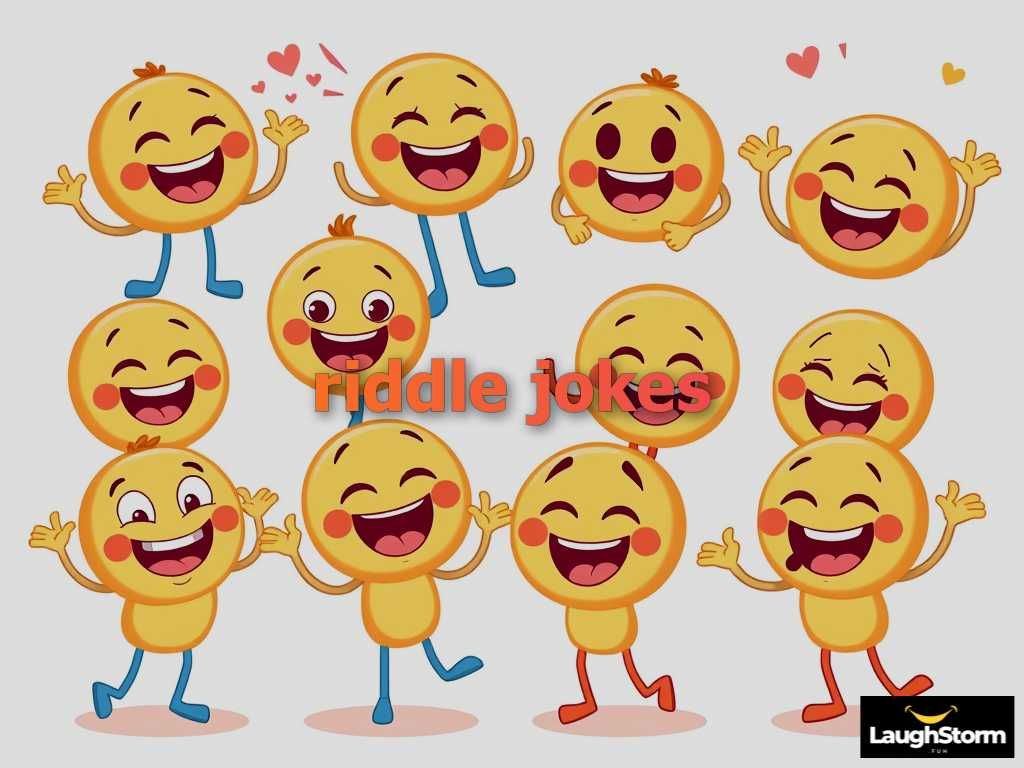Riddle Jokes: The Art of Witty Wordplay
Riddle jokes have stood the test of time as a beloved form of entertainment, combining both the mystique of riddles and the humor of jokes. They awaken the inner detective in us, challenging our minds to unravel clues and arrive at a punchline that elicits laughter. In this blogpost, we’ll dive into the captivating world of riddle jokes, explore their history, structure, and how they foster creative thinking. Moreover, we aim to provide you with a bundle of original riddle jokes that you can share with friends and family to ensure the laughter never ceases.
The Genesis of Riddles
Riddles have been part of human culture for centuries. Often used in ancient civilizations, these enigmas were not only thought-provoking but were also a means of storytelling and preserving histories. As literature evolved, so did the complexity and nuances of riddles. Ancient Greeks and Romans delighted in riddles, often using them in games and public gatherings.
Over time, riddles began to intertwine with humor, leading to the delightful creation of riddle jokes. These jokes expand beyond mere wordplay, often incorporating clever twists that entice listeners, challenging their wit while providing a hearty chuckle.
What Makes a Good Riddle Joke?
Creating an effective riddle joke is an art form. Here are some key elements that contribute to a memorable riddle joke:
-
Clarity: A good riddle should be easily understood but still challenge the audience’s thinking. The wording must be clear while allowing for ambiguity in the answer.
-
Brevity: The best riddles are succinct. Long-winded explanations can ruin the punchline and stifle the anticipation of the audience.
-
Creativity: A unique perspective or unexpected twist can elevate a riddle from ordinary to extraordinary. Utilizing everyday objects or situations can spark imaginative answers.
-
Logical Structure: There should be a logical pathway that leads to the punchline. This encourages thinkers to reason through the riddle systematically.
-
Humor: The ultimate goal of a riddle joke is to invoke laughter. A good punchline should transform the riddling experience into a light-hearted one.
The Unique Charm of Riddle Jokes
Riddle jokes possess a unique charm that resonates with individuals of all ages. They encourage critical thinking, boost cognitive abilities, and provide a platform for creativity. The blend of inquiry and humor makes riddle jokes versatile. They can be used in educational settings to promote engagement or among friends to break the ice.
Moreover, their philosophical depth allows for various interpretations, making them applicable in diverse contexts. Riddles can capture our understanding of language, culture, and even our shared human experiences.
Internal Linking for Enhanced Learning
If you’re interested in exploring the humorous side of everyday professions, check out our collection of plumber jokes. They can brighten up even the drabbest day! Additionally, for those curious about quirky scenarios, our olive oil spill oil jokes are bound to bring some laughter and joy.
Original Riddle Jokes
To celebrate the world of riddle jokes, here’s a collection of original riddles that are sure to amuse. Feel free to share these with your friends or use them as brain teasers at your next gathering!
-
Riddle: What can you hold in your right hand but never in your left hand? Answer: Your left hand!
-
Riddle: I speak without a mouth and hear without ears. I have no body, but I come alive with wind. What am I? Answer: An echo.
-
Riddle: What has keys but can’t open locks? Answer: A piano.
-
Riddle: You see me once in June, twice in November, but not at all in May. What am I? Answer: The letter ‘e’.
-
Riddle: I can travel around the world while staying in a corner. What am I? Answer: A stamp.
-
Riddle: What has hands but can’t clap? Answer: A clock.
-
Riddle: What can fill a room but takes up no space? Answer: Light.
-
Riddle: The more you take, the more you leave behind. What am I? Answer: Footsteps.
-
Riddle: I have branches, but no fruit, trunk, or leaves. What am I? Answer: A bank.
-
Riddle: What begins with T, ends with T, and has T in it? Answer: A teapot.
-
Riddle: What has a neck but no head? Answer: A bottle.
-
Riddle: Forward I am heavy, but backward I am not. What am I? Answer: The word ‘ton.’
-
Riddle: What can you catch but not throw? Answer: A cold.
-
Riddle: It belongs to you, but your friends use it more. What is it? Answer: Your name.
-
Riddle: I am not alive, but I can grow; I don’t have lungs, but I need air; I don’t have a mouth, but water kills me. What am I? Answer: Fire.
-
Riddle: I go in hard, come out soft, and am never the same. What am I? Answer: Chewing gum.
-
Riddle: What can run but never walks, has a mouth but never talks? Answer: A river.
-
Riddle: What building has the most stories? Answer: A library.
-
Riddle: I have wings, but I’m not a bird; I can fly, but I’m not a plane. What am I? Answer: Time (as in “time flies”).
-
Riddle: What is full of holes but still holds water? Answer: A sponge.
-
Riddle: What gets wetter as it dries? Answer: A towel.
-
Riddle: What has to be broken before you can use it? Answer: An egg.
-
Riddle: What starts with a P, ends with an E, and has thousands of letters? Answer: The post office.
-
Riddle: What can’t be put in a saucepan? Answer: Its lid.
-
Riddle: What has many teeth but cannot bite? Answer: A comb.
-
Riddle: I live in the water, but I am not a fish. I can wash away your troubles without a fuss. What am I? Answer: A wave.
-
Riddle: What comes down but never goes up? Answer: Rain.
-
Riddle: I can be cracked, made, told, and played. What am I? Answer: A joke.
-
Riddle: What has a face and two hands but no arms or legs? Answer: A clock.
-
Riddle: What can you keep after giving it to someone? Answer: Your word.
Conclusion
Riddle jokes transform ordinary moments into vibrant, laughter-filled experiences. They spark curiosity and stimulate thought, all while being a source of delight. By engaging in the hunt to decipher these clever enigmas, we boost our critical thinking skills and embrace our creative sides. So, the next time you’re looking for a fun conversation starter, just remember the joy that a simple riddle can bring.
In celebration of the timeless craft of riddles, we encourage you to share this post and spread the laughter, wisdom, and creativity that riddles encapsulate. Happy riddling!

